
/
Dogodki
/
Konference
Schooling Italians in Rijeka and Slovenes in Trieste. Integration, Assimilation, and Ethnic Resistance of Minorities in the Cold War Experience and Beyond
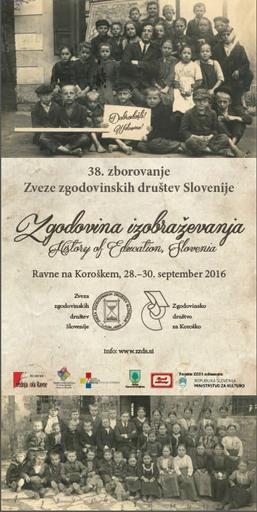
Avtor(ji):Vanni D'Alessio
Leto:2016
Založnik(i):Zveza zgodovinskih društev Slovenije, Ljubljana, Inštitut za novejšo zgodovino, Ljubljana
Jezik(i):angleščina
Vrst(e) gradiva:video
Ključne besede:Italijani, Slovenci, manjšine, šolstvo, Italians, Slovenes, minorities, schools, cold war, hladna vojna
Avtorske pravice:

To delo avtorja Vanni D'Alessio je ponujeno pod Creative Commons Priznanje avtorstva-Nekomercialno-Brez predelav 4.0 Mednarodna
Datoteke (5)
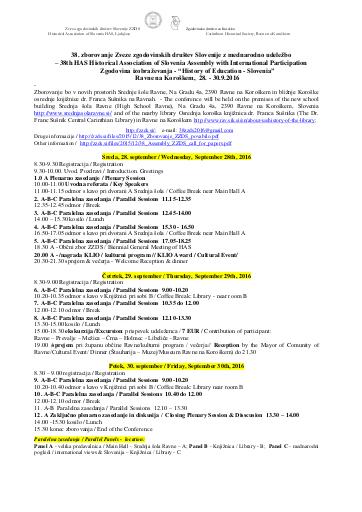
Ime:program-38-zborovanja-ZZDS.pdf
Velikost:313.04KB
Format:application/pdf
Stalna povezava:https://hdl.handle.net/11686/file22602
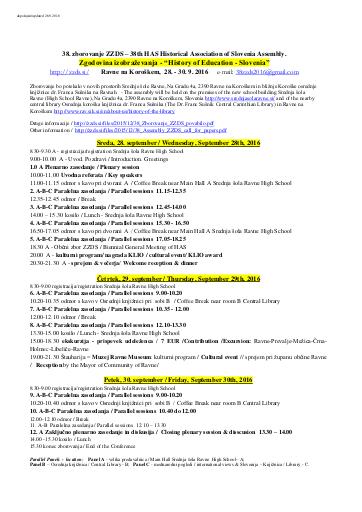
Ime:program-38-zborovanja-ZZDS-SLO-ANG.pdf
Velikost:303.57KB
Format:application/pdf
Stalna povezava:https://hdl.handle.net/11686/file22603
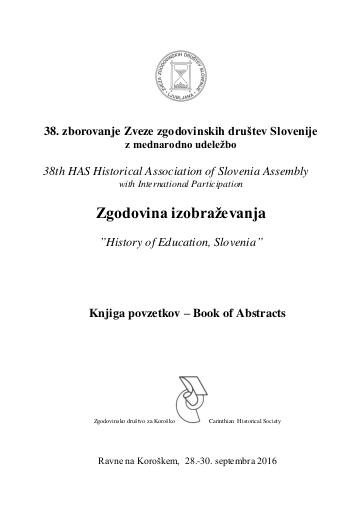
Ime:Knjiga-povzetkov–book-of-abstracts.pdf
Velikost:895.33KB
Format:application/pdf
Stalna povezava:https://hdl.handle.net/11686/file22604
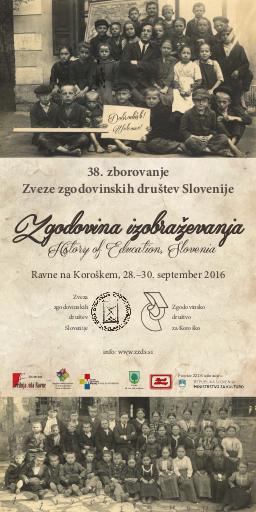
Ime:Plakat-38-zborovanja-ZZDS.pdf
Velikost:1.36MB
Format:application/pdf
Stalna povezava:https://hdl.handle.net/11686/file22605
Opis
The question of the language of education has been a major concern and political battlefield of Italian, Croatian and Slovenian circles in the late Habsburg northeastern Adriatic. After a period of forced Italianization and the disappear of Croatian and Slovenian language schools, since the end of World War II, Croatian and Slovenian schools began again to be opened alongside the Italians. The aim of this paper is to discuss in particular the problem of minority schools since then, and to concentrate on the case of Italian language schools in Rijeka, attempting a comparison with the case of the Slovenian schools in Trieste. The preservation of Italian and of Slovenian languages and cultures as minorities in post war Yugoslavia and Italy, had to be reconfigured in two very different ideological and political realms. The right of receiving an education in their own language raised problems of defining Italians and Slovenes in a dramatic political conjuncture and in a dynamic multilingual environment, in the context of the Italo-Yugoslav contest and of the Cold War confrontation. The minority schools in Rijeka and in Trieste are seen as places of constant confrontation and measurement of the processes of integration of minority speaking families in the new political, cultural and ideological contexts.
Metapodatki (11)
- identifikatorhttps://hdl.handle.net/11686/37369
- naslov
- Schooling Italians in Rijeka and Slovenes in Trieste. Integration, Assimilation, and Ethnic Resistance of Minorities in the Cold War Experience and Beyond
- avtor
- Vanni D'Alessio
- predmet
- Italijani
- Slovenci
- manjšine
- šolstvo
- Italians
- Slovenes
- minorities
- schools
- cold war
- hladna vojna
- opis
- The question of the language of education has been a major concern and political battlefield of Italian, Croatian and Slovenian circles in the late Habsburg northeastern Adriatic. After a period of forced Italianization and the disappear of Croatian and Slovenian language schools, since the end of World War II, Croatian and Slovenian schools began again to be opened alongside the Italians. The aim of this paper is to discuss in particular the problem of minority schools since then, and to concentrate on the case of Italian language schools in Rijeka, attempting a comparison with the case of the Slovenian schools in Trieste. The preservation of Italian and of Slovenian languages and cultures as minorities in post war Yugoslavia and Italy, had to be reconfigured in two very different ideological and political realms. The right of receiving an education in their own language raised problems of defining Italians and Slovenes in a dramatic political conjuncture and in a dynamic multilingual environment, in the context of the Italo-Yugoslav contest and of the Cold War confrontation. The minority schools in Rijeka and in Trieste are seen as places of constant confrontation and measurement of the processes of integration of minority speaking families in the new political, cultural and ideological contexts.
- založnik
- Zveza zgodovinskih društev Slovenije
- Inštitut za novejšo zgodovino
- datum
- 2016
- 28. 09. 2016
- tip
- video
- jezik
- Angleščina
- jeDelOd
- pravice
- licenca: ccByNcNd